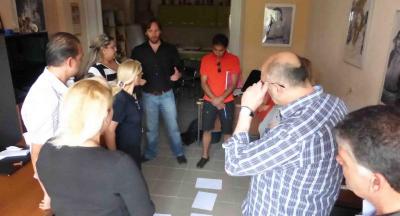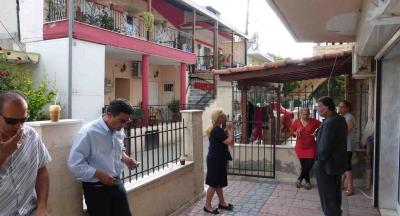Ampelokipi - Menemeni
Greece Country Assessment drafted by Christina Christou, facilitator in ROMED2, is available in Greek and English.
*Disclaimer: The information and views set out in this page are those of the author and do not necessarily reflect the official opinion of the Council of Europe and/or the European Commission. Neither the Council of Europe, the European Commission nor any person acting on their behalf may be held responsible for the use which may be made of the information contained therein.
The Municipality of Ampelokipi –Menemeni is the result of the merger of Municipalities of Ampelokipi and Menemeni. It is located and occupies the northwestern side of the wider area of Thessaloniki and administratively belongs to the Region of Central Macedonia. Its total area is of 591.73 hectares with a population of 52,127 residents according to the latest census.
The first presence of Roma population in the Municipality was recorded in the area of Dendropotamos, located in the Western part of the municipalities and dates back to 1953. The first population consisted of no more than 30 families (approximately 160 persons) coming from several regions in Greece. At first the families created a settlement near the local stream and lived in improvised housing (tents, shacks, etc.) in the absence of basic amenities and vital infrastructure. At the moment, Dendropotamos counts approximately 3500 residents, 3000 of whom are Roma making up the largest Roma community in the city of Thessaloniki. The vast majority (95%) live in proper housing conditions with only a small part (less than 50 families), who arrived in Thessaloniki over the last 20 years in Dendropotamos, living in shacks. Most Roma in Dendropotamos are vendors in local open markets and bazaars in the whole region.
The huge economic downturn is still the most important risk and challenge faced by Roma communities in Greece, including the Roma community of Dendropotamos.
The CAG in Ampelokipi-Menemeni is made up mostly of women (11 out of a total of 14 CAG members), with ages between 19 and 48. Two members are mediators trained under the ROMED1 Programme, one of which holds the Chair of the “Association of Roma Women of Dendropotamos” while the second holds the position of Secretary, with experience particularly in the work in educational programmes, as was the case for the “Education of Roma Children” programme implemented by the Aristotelian University of Thessaloniki over the last four years. Some of the CAG members attend Second Chance High School while two members graduated from University: one with a degree in Infant Care and another who works as a teacher and is involved in the above-mentioned programme. All members hold occasional jobs at the same time to support their family income. The CAG members who are men are license holders at local open markets, engaged in the commerce of textile and other products and one of them is a musician. One of the CAG members was elected as Community Councillor in Dendropotamos.
The fact that the group is mobilized by mostly young women gives a specific dynamic which could become inspirational to other women in the community. Moreover, the active presence of the local Roma Women Association allowed the NST in Greece to raise their expectations as to the capacities of the CAG in Ampelokipi – Menemeni to induce changes in the community. In fact, most CAG members have been active board members within the Roma Women's Association "ΣΥΛΛΟΓΟΣ ΓΥΝΑΙΚΩΝ ROMA ΔΕΝΔΡΟΠΟΤΑΜΟΥ ΘΕΣΣΑΛΟΝΙΚΗΣ", the intervention of ROMED only increased the dynamic, the skills and knowledge of this already active group within the Dendropotamos municipality.
By the end of 2015, the CAG managed to attract the membership of young Roma high-school students who had been showing interest to participate in the local processes and contribute to developments regarding the whole neighborhood of Dendropotamos.
These three young students, not only submitted concrete proposals regarding several issues for the improvement of their school building, but also significantly contributed in the shaping of proposals for the redevelopment of the central road of Dendropotamos and for the "Centre" of the neighborhood, which is the place that is most frequented by the youth and children (Roma and non-Roma) in the neighborhood.
Moreover, one of the CAG members was the only woman that was invited, together with other Greek Roma Leaders, by the Committee of Roma issues of the Greek Parliament to express on the current situation of Roma in Greece, and also their opinion on the National Roma Strategy for Roma.
After the merger of municipalities in Greece through the "Kallikrates" Program, have been created "municipal districts", which have their own departmental councils, which are can be compared what we say "Local Councils".
Short-term priorities
- provide safe means of transport for Roma women in Dendropotamos who attend Second Chance School. Currently, the bus stop is located in what is considered to be a dangerous area, and young Roma women feel unsafe, especially during the evening when they return from school;
- build shelters in bus stops in Dendropotamos; at the moment there is no protection from rain or sun for people waiting for the bus;
- ensure proper street naming and numbering in the neighborhood.
Long-term priorities
- clean the area near the local stream, since the latter is now an insanitary environment for the local general population of Dendropotamos. This priority requires the urgent attention of Municipal Services as the area presents serious unsanitary conditions which can rapidly give way to outbursts of related diseases;
- improve bus routes connecting Dendropotamos to the rest of Thessaloniki in terms of: timetable, variety of lines, mechanical and physical state of buses; approximately all buses are old, damaged and largely neglected;
- improve public spaces in the neighborhood (squares, parks, sport facilities, etc.) and the overall living conditions in the neighborhood.
The Municipality has taken into account the Request Letter sent by the CAG at the end of 2014 and is currently initiating the process in order to deal with the listed issues of the local Roma community.
The Region is expected to present its Operational Plan for the upcoming Programming Period with regard to the Roma Inclusion and the Executive of the Regional Managing Authority of Central Macedonia is ready to consult the National Support Team on this matter.
In an overall aspect in relation to developments in the ROMED2 process in the Municipality, there is a satisfactory progress in the cooperation with the Local Authorities, with Municipal and Regional Staff and with the local CAG.
A Joint Action Plan was adopted in November 2015 during a meeting where 5 women from Dendropotamos participated, including the two ROMED1 mediators. The three Roma students from the nearby highschool who had submitted specific proposals regarding the improvement of their school were also present. Finally, there were six representatives of the municipal authority. Among them, the General Secretary of the Mayor, one project officer, the head of the construction department and one employee from the social services.
The JAP includes specific interventions and constructions works that were agreed in the Joint Meeting and mainly are related to reparation works of the Central Road of Dendropotamos (Costantinoupoleos Str) and the rehabilitation of premises for the High school and Lyceum of Dendropotamos .
More specifically, the Joint Action Plan of Municipality and CAG includes the following:
A) For the School:
• Construction and Installation of railings on the windows on the upper floors of the school;
• Construction and Installation of Canopies in the courtyard of the school;
• Installation of a drainage system for rainwater in the courtyard of the school;
• Reparation and water proofing the roof of the school (currently leaking);
• Solving a security issue, regarding the position - orientation of the School's entrance.
B) For the Central Road of Dendropotamos (Constantinoupoleos Str):
• Construction - Restoration of pavements;
• Ensuring the safe passage of pedestrians;
• Restoration - Improvement - Expansion of Municipal Lighting;
• Fixing the runoff of rainwater in Constantinoupoleos Str;
• Categorisation as a "Low traffic" Road;
• Renewal - Expansion of urban signage in Constantinoupoleos Str;
• Road Restoration - paving of Constantinoupoleos Str.
• Redrawing a new layout for the square on the Constantinoupoleos Str., in cooperation and in accordance with proposals that will be submitted by the CAG (update: a proposal on the layout was submitted by the CAG in the first quarter of 2016)
UPDATE 2016:
During the first quarter of 2016, repair works on the school building have already started - in line with the proposal coming from the three new young CAG members.
Furthermore, a proposal for the restauration of the central square of the Dendropotamos neighborhood was submitted by the CAG.
Last but not least, the Technical Service of the Municipality in cooperation with the CAG has finalised the blueprint of the central road of Dendropotamos as well as of the aforementioned central square.


